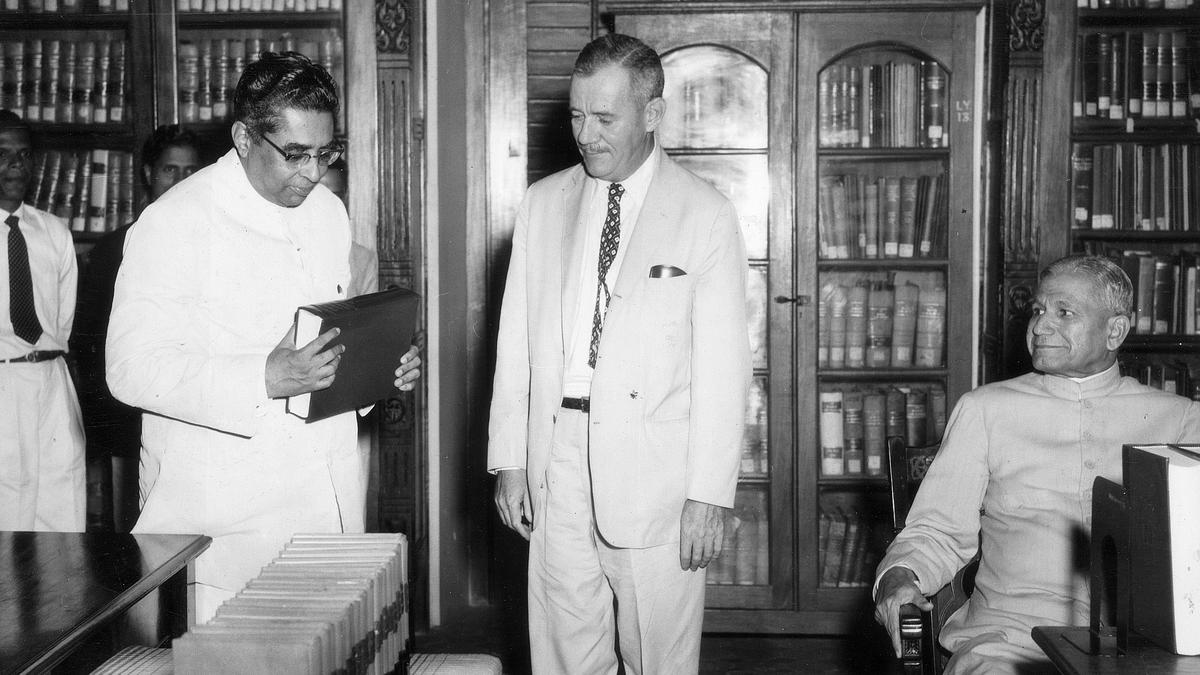
How a previous attempt in Tamil Nadu to study Centre-State relations panned out
The Hindu
DMK government's high-level committee on Centre-State relations faces opposition from BJP, echoing past debates on autonomy.
The decision of the DMK government, led by M.K. Stalin, to constitute a three-member high-level committee on the Centre-State relations has run into opposition, expectedly, from the Bharatiya Janata Party (BJP) and its ally, Tamil Maanila Congress (Moopanar). Over 50 years ago, the recommendations of the Rajamannar Committee, which was also constituted by the DMK government in September 1969 to study the same subject, were out in May 1971. Then, different parties, some of which are now allies of the DMK, were critical of the recommendations. Among them were two Congress parties — one spearheaded by the then Prime Minister, Indira Gandhi, and the other led by Morarji Desai, K. Kamaraj, and other leaders; the two Communist parties; and the Bharatiya Jana Sangh (BJS), the precursor to the BJP.
The committee was headed by former Chief Justice of the Madras High Court P.V. Rajamannar, and A. Lakshmanaswami Mudaliar, former Vice-Chancellor of Madras University, and P. Chandra Reddy, another former Chief Justice of the High Court, were the members. The committee recommended that the base of devolution of revenue to the States be widened. It suggested that a number of subjects — to cite a few, stock exchanges, futures markets, and regulation and development of oil fields — be transferred from the Union List to the State List. It called for the transfer of several subjects from the Concurrent List to the State List.
Among the subjects identified by the committee for the transfer were trade unions, industrial and labour disputes, shipping and navigation on inland waterways, factories, electricity, newspapers, and books and printing processes.
Another key recommendation was that an Inter-State Council, consisting of all Chief Ministers, be constituted, with the Prime Minister as the Chairman. The committee also suggested the formation of a committee for redistribution of entries in the Union and Concurrent Lists of the Constitution, according to materials available with The Hindu archives.
Similar to the criticism made by the newly elected president of the BJP State unit, Nainar Nagenthran, that the demand for complete autonomy for States would weaken the country, there were apprehensions that the Rajamannar Committee was formed as a prelude to the launch of a separatist agitation. In April 1971, replying to the four-day debate in the Assembly on the Governor’s address, Chief Minister M. Karunanidhi emphasised that his government’s demand for more powers for the States should not be mistaken for a demand for secession. He felt that the transfer of more powers to the States would strengthen the federal set-up. Once decentralisation was effected, the Centre would be able to function more efficiently. Later, Karunanidhi clarified that the committee’s report was not “the forerunner to any agitation” against the Centre. The day after the report was made public, the Chief Minister, speaking at a public meeting in Vellore on May 28, stressed that the intention was not to have any confrontation with the Centre but to ensure the provision of “wider powers” to the States for speedy implementation of development programmes.
On the day the committee’s report was released in Chennai, Prime Minister Indira Gandhi told Parliament that the Administrative Reforms Commission, which studied the question in the latter half of the 1960s, concluded that the present provisions of the Constitution were adequate for regulating the relationship and resolving the disputes.
Bharatiya Jana Sangh leader Atal Bihari Vajpayee contended that the recommendations of the committee would promote “regionalism to a dangerous extent”. Accepting them would mean the beginning of the end of India as a nation, he said in his presidential address at the party’s general council session in Udaipur on July 3, 1971. A strong Centre, however. did not mean weak States. The necessity of decentralisation should be accepted for the resolution of genuine difficulties of the States in financial and industrial development. But the attempt to achieve the disintegration of India in the name of decentralisation must be foiled, Vajpayee declared. CPI(M) leader E.M.S. Namboodiripad told the media in Chennai in July 1972 that the key recommendations of the committee went “against autonomy, against the unity of India, and against social progress”. Criticising the ruling DMK for “not being clear in its demand for State autonomy”, the veteran leader, also a former Chief Minister of Kerala, thought that one of the important recommendations — any difference between the States be left to the proposed Inter-State Council — would not help to resolve the problems facing the States.

 Run 3 Space | Play Space Running Game
Run 3 Space | Play Space Running Game Traffic Jam 3D | Online Racing Game
Traffic Jam 3D | Online Racing Game Duck Hunt | Play Old Classic Game
Duck Hunt | Play Old Classic Game











